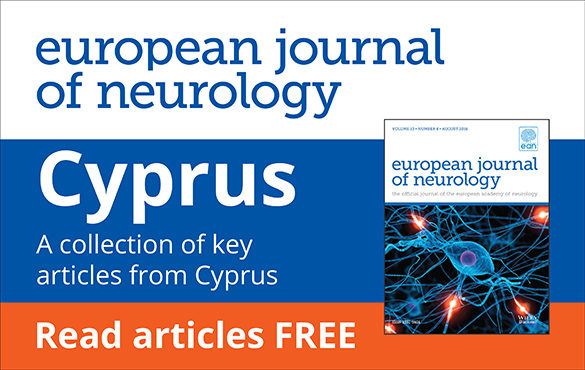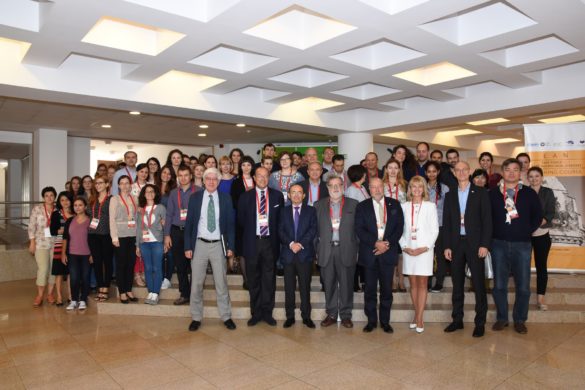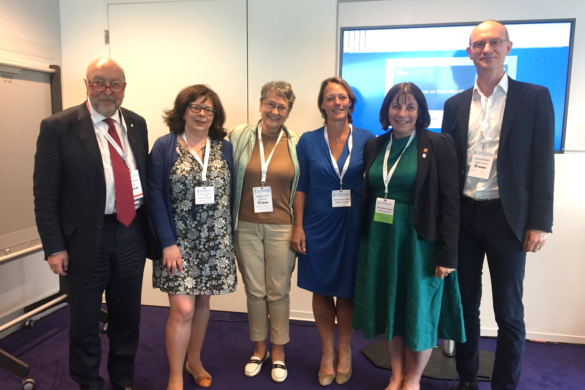Please find below articles from Cypriot authors and co-authors that were published in the European Journal of Neurology
Category
Research
-
-
Paper of the MonthEAN NewsFeatured Slider
A Round Table on the Paper of the month: Can beta-receptor agonists prevent PD?
November 1, 2017For November 2017, we have selected: Mittal S, Bjørnevik K, Im DS, et al. ß2-Adrenoreceptor is a regulator of the α-synuclein gene driving risk of Parkinson’s disease. Science 2017;140:2295-2305. Disturbed proteostasis of α-synuclein is now thought to play a critical role in the pathogenesis of Parkinson’s disease (PD). Physiological functions of this protein include synaptic transport as well as involvement in the metabolism of membrane phospholipids, and in the differentiation and survival of dopaminergic neurons. -
ResearchScientific panels reports
Activities of the Scientific Panel of Neuro-Oncology 2016-2017
October 13, 2017The actual and ongoing agenda of the EAN – NeuroOncology Panel was presented during the EAN 2017 in Amsterdam at the Panel meeting. The following activities were discussed in detail: Guidelines, provided by the EAN-Scientific Panels, are one… Continue Reading -
ResearchScientific panels reports
Activities of the Subspeciality Scientific Panel on Dementia and Cognitive Disorders Panel 2016-2017
October 9, 2017SP on Dementia and Cognitive Disorders Panel met during recent EAN Congress in Amsterdam. Co-chairs Reinhold Schmidt from Austria and Jakub Hort from Czech Republic welcomed members and announced that Prof. Dafin Muresanu from Romania has been appointed as… Continue Reading -
ResearchScientific panels reports
Scientific Panel on Palliative Care: Report 2016-2017
October 5, 2017The Panel met at the EAN Congress in Amsterdam and the Co-Chairs presented the main points from the Panel Chairs meeting. It was agreed that the Panel would approach all members to suggest a Neurologist in training to join… Continue Reading -
ResearchScientific CornerTop Articles
A new guideline on cerebral venous thrombosis – Guideline paper by José Ferro
October 2, 2017A new guideline on cerebral venous thrombosis (CVT) diagnosis and treatment issued by the European Stroke Organization (ESO) and endorsed by the European Academy of Neurology (EAN) was recently published in ESO (long version) and EAN (abbreviated version) official journals [1, 2]. -
ResearchScientific Corner
EAN Task Force for Rare Neurological Diseases – Report from the Teaching Course
October 2, 2017It is a pleasure to share with the European neurological community the outcome of the first teaching course for rare neurological diseases. The course took place in Cluj-Napoca, Romania, from 7th to 9th September 2017. -
Paper of the MonthEAN NewsFeatured Slider
Paper of the month: Beneficial effects of lamotrigine in myotonias
October 2, 2017For October 2017, we have selected: Andersen G, Hedermann G, Witting N, Duno M, Andersen H, Vissing J. The antimyotonic effect of lamotrigine in non-dystrophic myotonias: a double-blind randomized study. Brain 2017;140:2295-2305. Patients with myotonia congenita and paramyotonia congenita can be disabled by the myotonic phenomenon in the activities of daily living, with a huge impact on their quality of life. -
ResearchScientific panels reports
Activities 2016-2017 of the EAN Scientific Panel Coma and chronic disorders of consciousness
September 25, 2017Summary of activities in the last 12 months The Panel reviewed currently used functional scores (K Diserens, Lausanne CH), posted one Neurology update (R. Formisano, Rome I), and submitted a review of relevant literature in the last 20 years for… Continue Reading -
ResearchScientific panels reports
Activities of the EAN Scientific Panel Clinical Neurophysiology 2016/2017
September 21, 2017Josep Valls-Sole summarized the activities of members of the panel approved for Amsterdam: Novelties in hands-on courses were the inclusion of surface EMG in the hands on course of EMG (together with conventional and single fiber). Therefore, there were 3… Continue Reading -
ResearchScientific panels reports
Activities of the EAN Scientific Panel Pain 2016/2017
September 16, 2017SP Pain met during recent EAN Congress in Amsterdam. Co-chair Nadine Attal from France welcomed members and presented last year panel’s activities. Last year was successful. SP Pain co-chairs Nadine Attal and Giorgio Cruccu had, together with members of… Continue Reading -
ResearchScientific panels reports
Activities of the EAN Scientific Panel Neurotraumatology 2016/2017
September 11, 2017SP Neurotraumatology met during recent EAN Congress in Amsterdam. Co-chairs Pieter Vos from the Netherlands and Oliver Kastrup from Germany welcomed members and introduced Dafin Muresanu from Romania, as a new liaison officer between the scientific committee and scientific… Continue Reading -
ResearchScientific Corner
Interview with Holm Graessner on the European Reference Networks – following the Meeting of the Rare Neurologic Diseases Task Force at EAN 2017
September 11, 2017Antonio Federico: What are the aims of your ERN? Holm Graessner: The aims of the European Reference Network for Rare Neurological Diseases (ERN-RND network) will be: To increase the overall percentage of rare neurological disease patients with a final diagnosis through information dissemination, improved access to expertise centres, introduction of an EQA scheme for genetic RND diagnostics and virtual multidisciplinary consultation -
Paper of the MonthFeatured Slider
Paper of the month: Long-term opioid therapy is not beneficial in patients with polyneuropathy
September 5, 2017For September 2017, we have selected: Hoffman EM, Watson JC, St Sauver J, Staff NP, Klein CJ. Association of long-term opioid therapy with functional status, adverse outcomes, and mortality among patients with polyneuropathy. JAMA Neurology 2017;74:773-779. Neuropathic pain is a common symptom in polyneuropathy that can be difficult to manage. Opioids are usually recommended as second-line treatment, with primary care physicians being mainly involved in opioid prescription. -
ResearchScientific Corner
Interview with Helen Cross on the European Reference Networks – following the Meeting of the Rare Neurologic Diseases Task Force at EAN 2017
September 4, 2017Antonio Federico: What are the aims of your ERN? Helen Cross: The objectives of the EpiCARE network will be: To improve accessibility of detailed diagnostics to individuals of all ages with rare and complex epilepsies across Europe, including clinical evaluation and investigation.








